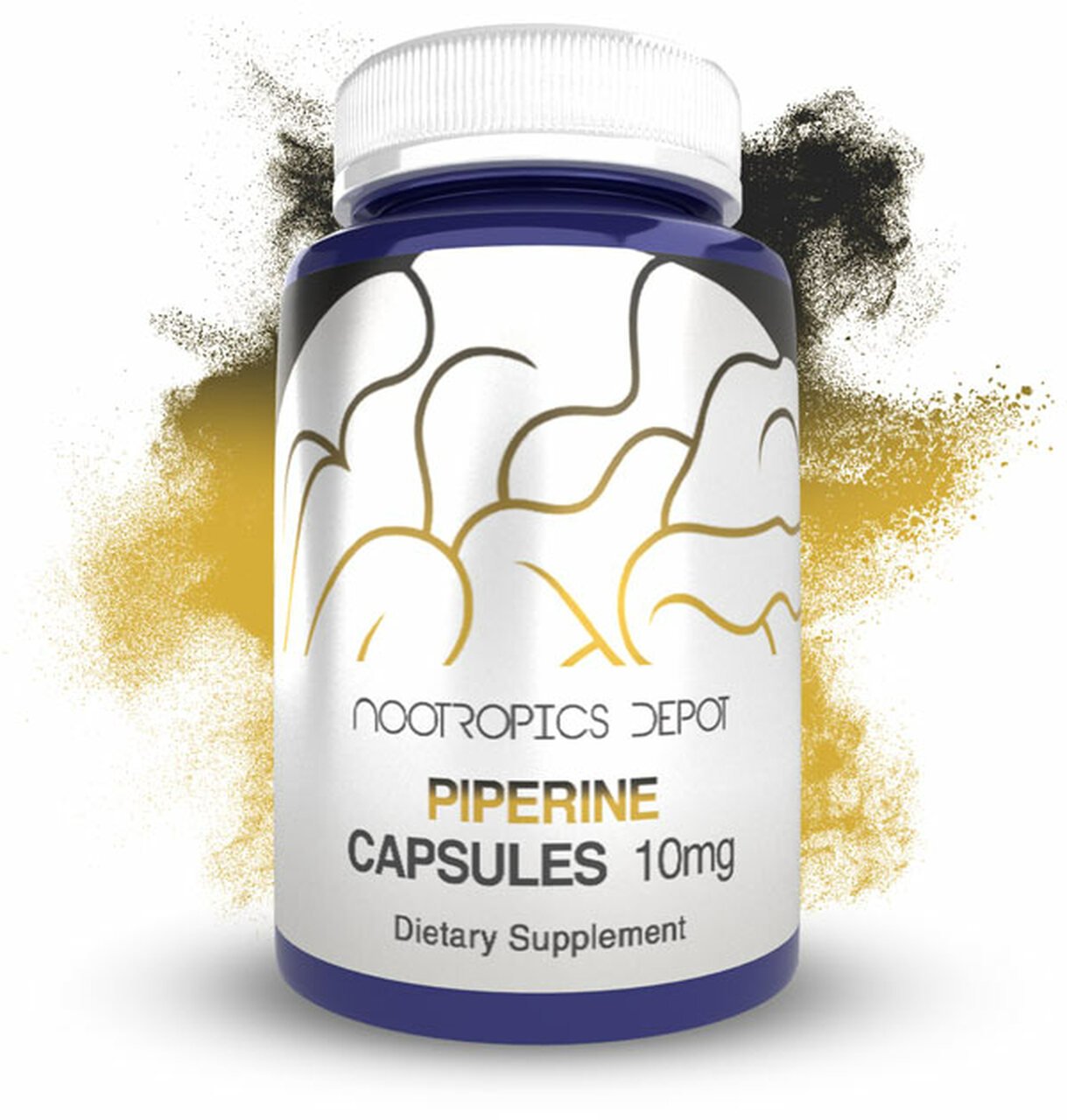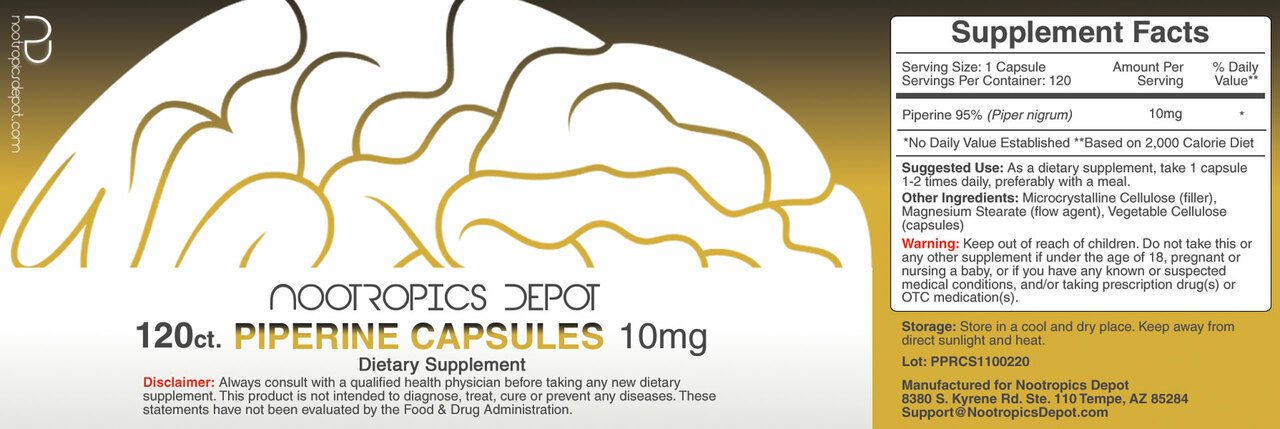Black Pepper
Article by Stefan Burns - Updated April 2022. Join the Wild Free Organic email newsletter!
| Name: | Black Pepper, Linnaean - Piper nigrum |
| Color: | Peppercorns are green when unripe and red when ripe on the vine. Dried peppercorns turn a dark brown/black, and if the dark outside skin is removed the peppercorns are white |
| Constituents: | Piperine, terpenes, resins, starches, hydrocyanic acid |
| Effect: | Powerful digestive aid, stimulates appetite, anti-microbial, increases gastric secretions and stimulate mucous membrane, boosts metabolism, antioxidant, anti-inflammatory, cognitive aid |
| Preparation: | Peppercorns are left out to dry in the sun until black. White peppercorns which have the outside skin removed have higher levels of piperine (about double). Ground into a powder for use as a spice. Piperine extracts used as a bioavailibility enhancer for other supplements, as a digestive aid, and as a cognitive aid |
| Dosing: | 1+ grams black pepper powder as a spice. 5-25 mg of 95% standardized piperine. |
| General Notes: | Pepper is one of the most popular spices used worldwide, has a pungency to it that increases appetite and readies the gastrointestinal system for digestion. Piperine is a potent bioavailibility enhancer for other compounds like anti-inflammatory curcuminoids (from turmeric) or psychadelic psilocybin (from magic mushrooms). Piperine is a promising natural supplement to aid in the treatment of neurodegenerative diseases. Has been used for thousands of years. |
What is Black Pepper?
Black pepper is a spice derived from the fruits of Piper nigrum, a perennial climbing shrub with white flowers. After flowering it produces small fruits ~6 mm in diameter which transition from green to yellow to red as they ripen.
The pepper plant is native to the coastal regions of southern India and is now cultivated worldwide in tropical and subtropical regions, requiring shade and high humidity.
Black pepper, the “king of spices”, is produced by drying green unripened peppercorns in the sun. Heat from the sun accelerates natural enzymatic reactions which turn the peppercorns black. Black pepper is used as a spice for flavoring food and as a food preservative.
Is Black Pepper Good for You?
Black pepper is used copiously around the world, being a near ubiquitous food seasoning, and it’s clear that black pepper isn’t harmful when used in reasonable amounts, and it’d be difficult to consume enough pepper to be problematic due to its pungency. Black pepper’s pungent nature is thanks to its main active compound, piperine, and its primarily piperine that gives black pepper its many wonderful health effects.
Piperine regulates gastrointestinal functionality, mediates inflammation, is neuroprotective, and even increases the bioavailability of other nutrients by enhancing their absorption.
Black pepper is an important health food that combines the benefits of being a strong antioxidant with antimicrobial properties. Through its free-radical scavenging ability black pepper is useful against cancer and controls the progression of tumor growth.
Black pepper isn’t just good for you, it’s really good for you, and it’s pepper’s long history of use for health and wellness in Ayurveda and Traditional Chinese Medicine that built the foundation of the worldwide pepper trade from antiquity to today.
Black Pepper Nutrition Facts
It’s first made clear that peppercorns are a health promoting herb by it’s attractive micronutrient profile. Pepper isn’t consumed in large enough amounts for its contribution of micronutrients in the diet to be especially notable for any single meal, but it is rich in a variety of micronutrients on a per gram basis, and when used as a seasoning over time, it’s micronutrient contributions to the diet do add up.
Vitamins (in 1 tbsp, 6 grams)
Vitamin K - 13% DV - 10 mcg
Vitamin A (as beta carotene) - 21 mcg
Vitamin C - 2% DV - 1.3 mg
Minerals (in 1 tbsp, 6 grams)
Potassium - 2% DV - 78.7 mg
Calcium - 3% DV - 27.3 mg
Magnesium 3% DV - 12 mg
Phosphorus - 1% DV - 10.8 mg
Iron - 10% DV - 1.8 mg
Manganese - 18% DV - 0.4 mg
Copper - 4% DV - 0.1 mg
Peppercorns also contain a lot of fiber being 20-45% starch by weight. Flavoring a dish with 1 or more teaspoons of black pepper overtime will help add vitamin K, manganese, iron, and piperine into the body.
As touched upon earlier, black pepper has numerous health benefits, and now we’ll learn more about the health
Black Pepper Health Benefits
Black pepper has a long list of health benefits due to its unique phytochemistry which is made up of a combination of volatile oils, oleoresins, and alkaloids. The main active ingredient in black pepper is piperine.
Black pepper essential oil contributes towards its aroma, and oleoresin contributes towards its taste. Black pepper stimulates appetite, increases the secretion of saliva, and stimulates the release of digestive enzymes. Black pepper enhances HCL production in the stomach and stimulates histamine H2 receptors. In effect even just the aroma of black pepper can stimulate digestive preparedness and thoroughness.
In addition to this black pepper is a diaphoretic and diuretic, capable of stimulating seating and urination. Black pepper and it’s main active ingredient piperine causes a flush of digestive fluids, which is another detoxification pathway. This combined effect is partly responsible for black pepper’s broader anti-inflammatory and anti-growth effect. As an antimicrobial, black pepper and piperine are able to gently balance the digestive system of malfunction, upset, or limited nutrient absorption. Piperine dramatically increases bioavailability for many nutrients, and increasing black pepper intake is one way to easily restore optimal digestive health.
Piperine is responsible for the pungency of black pepper, making up 3-10% of peppercorns by weight. It’s is an alkaloid that is sensitive to light, insoluble in water and acts as a weak base. Piperine is responsible for the main health benefits of black pepper, and when black pepper is consumed whole it has a broader health boosting effect but can’t be as powerfully isolated in effect as 25, 50, or 100 mg of piperine can be.
Piperine Benefits
Increases bio-absorption of vitamins and trace elements
Decreased fat accumulation
Improves digestion
Antimicrobial
Effective against acute inflammation
Piperine ameliorates chronic mild stress
Stimulates anti-cancer pathways
Reduces the extent of toxicity for certain chemicals
Uses for Black Pepper
The properties of black pepper make it useful for ailments of the digestive system. Black pepper tones the muscles of the stomach and stimulates the mucous membranes. Black pepper can be used in constipation and diarrhea.
Black pepper speeds up the metabolic procedures that generate heat in the human body, raising body temperature and burning bodyfat.
As an antimicrobial and anti-parasitic, black pepper can be used to steer the microbiome towards better symbiosis and reduce detrimental vagus nerve inputs. Black pepper can be used for altering neurotransmitter production in the gut. Black pepper and its active ingredients can be supportive in treating disorders of the nervous system which include depression, Alzheimer's, epilepsy, and others.
Black pepper can also simulate the diaphragm (who hasn’t sneezed from black pepper before).
In high doses can be used as a abortifacient and use should be avoided around pregnancy.
Supplementing with Piperine
At higher doses of 25+ mg, piperine exerts its influence on the body strongly. Piperine is an inhibitor of MAO activity, which is a potential treatment path for depression and Parkinson’s disease. Piperine also has the possibility of increasing serotonin and dopamine levels under conditions of stress.
To supplement with piperine use 0.5-1 mg/kg of bodyweight. A good starting dose is 25 mg and increasing from there.
Nootropics Depot Piperine
A standalone piperine supplement allows for piperine to be supplemented alongside other herbs in other to boost their bioavailability. This is useful for a bunch of herbs, namely turmeric, green tea, and medicinal mushrooms.
Nootropics Depot conveniently sells piperine extract in 10mg capsules. Piperine is highly sensitive and will degrade quickly when exposed to light, so supplementing with piperine in capsule form instead of with a powder is not only easier in dosing but also lowers the amount of degradation that will occur due to light exposure.
Black Pepper Ayurveda
In the Ayurveda system of medicine black pepper is an energetically heating spice used to support digestion and assists the flow of qi energy downwards.
Black Pepper vs White Pepper
White pepper differs in its harvest from black pepper. Instead of picking unripe green berries and letting them dry in the sun, as is done with black pepper, the berries are allowed to ripen on the vine and then soaked to remove the skin. Machinery can also be used to remove the outer layer.
Having ripened on the vine and having it’s outer skin removed, white pepper is distinct from black pepper in its aroma and taste. There are differences between black pepper and white pepper as it relates to piperine content. Piperine yield from black pepper was 2.5% - 3.0% and from white pepper 4.0% - 4.5%. The purity of the piperine was found to be up to 98.5% for black pepper and 98.2% for white pepper. White pepper provides about 50% more piperine per weight than black pepper.
Medical Disclaimer: All information, content, and material of this website is for informational purposes only and is not intended to serve as a substitute for the consultation, diagnosis, and/or medical treatment of a qualified physician or healthcare provider.
References:
Malcom Stuart, et al. The Encyclopedia of Herbs and Herbalism. Crescent Books, New York.
Butt MS, Pasha I, Sultan MT, Randhawa MA, Saeed F, Ahmed W. Black pepper and health claims: a comprehensive treatise. Critical Reviews in Food Science and Nutrition. 2013;53(9):875-886. https://doi.org/10.1080/10408398.2011.571799
Rahman Khan Z, Moni F, Sharmin S, et al. Isolation of bulk amount of piperine as active pharmaceutical ingredient (Api) from black pepper and white pepper(<i>piper nigrum</i> l.). PP. 2017;08(07):253-262. https://doi.org/10.4236/pp.2017.87018
Disclosure: Wild Free Organic is a member of various affiliate programs and if a purchase is made through one of our affiliate links a small commission is received. This does not affect your purchase price. Visit our disclosure page for more information.








Elderberry is a fruit well-known for its antiviral properties, helping to fight viral infections preventatively, at the early stages, and during the late cycle of infection. Elderberry has many other health benefits too thanks to its flavonoids and anthocyanins, and it's easy to prepare into a juice, syrup, extract, or tea as you'll learn with this article.